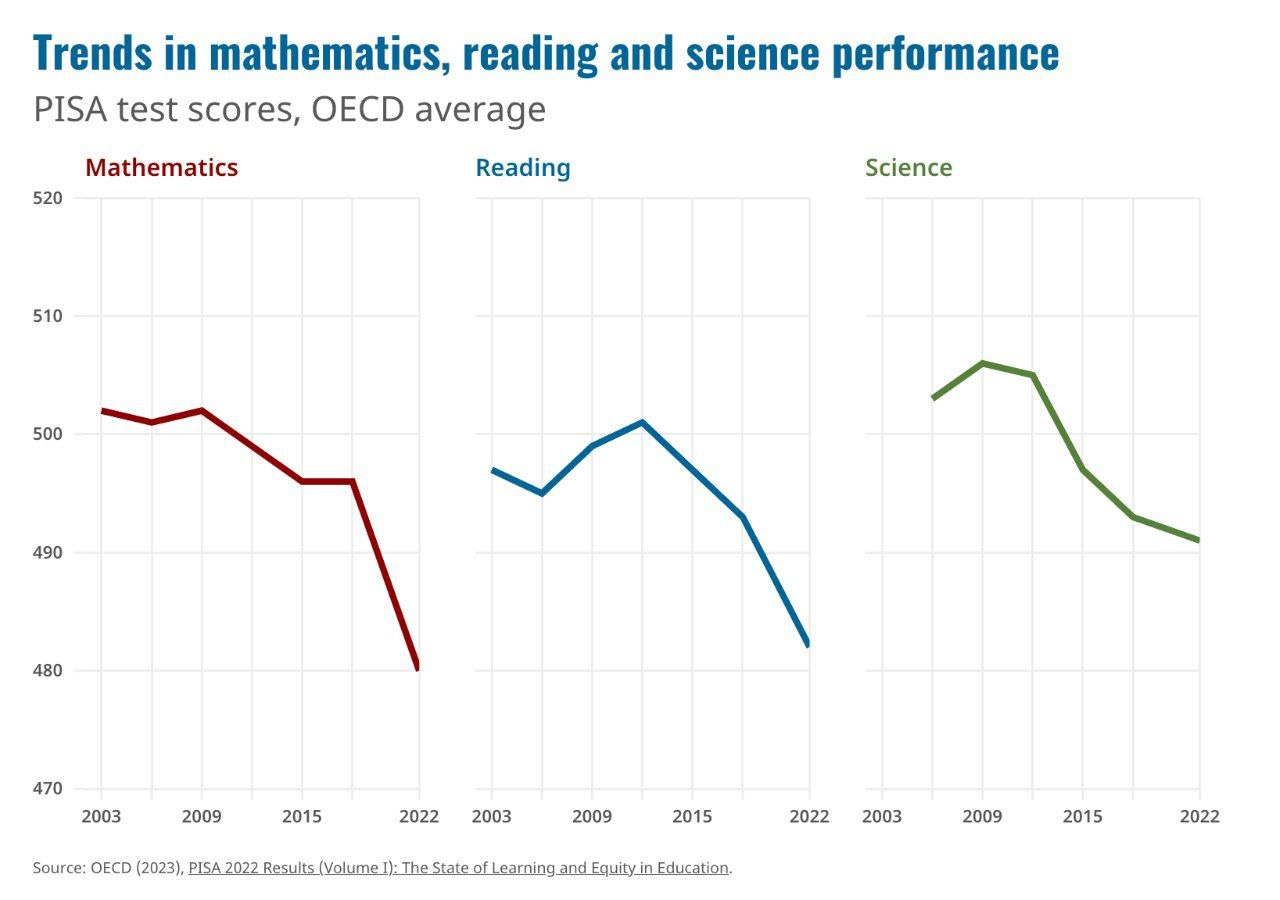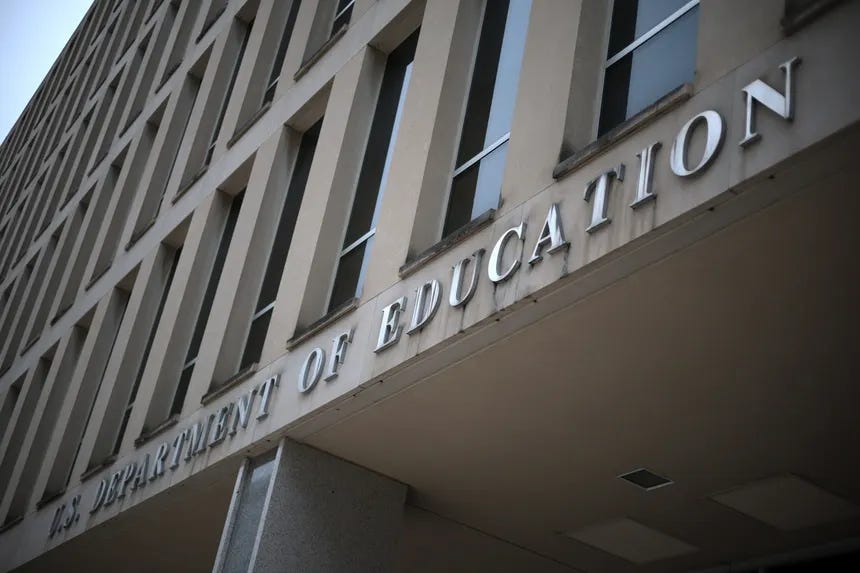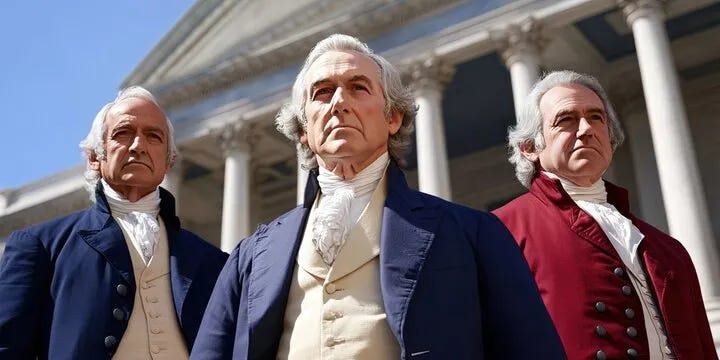One Graph Says Everything You Need to Know About Why the Dept of Education Needs Elimination
We already have the alternatives laid out for us by our heritage since 1619
What it doesn’t show you is the slide downwards that started in the 1970s, not in 2003.
The curriculum in my high school was so disciplined that we did not have to take the SAT or Achievement tests required of high school students for those entering college.
Princeton changed its mind in 1970 during my last year in high school, and required it of all high schools.
They discovered that too many of those who were exempt from the testing were not doing so well in college.
So something was already changing and not for the better.
And all of it never recovered.
So Jimmy Carter, in his infinite “wisdom”, implemented the Department of Education.
This only set the stage later for the quote…
If you put the federal government in charge of the Sahara Desert,
in 5 years there'd be a shortage of sand. ~ Milton Friedman
Milton gets the credit for the quote, but there is some dispute as to whether he was truly the first to share that thought.
Giv yourself a gift and take some time to look for and research the personal letters and correspondence of our Founding Fathers and their families - the Library of Congress, our National Archives, and various organizations devoted to each Founding Father are highly recommended for original resources (written by the author, not written by an author about the source).
An AI search for “<Name> archives” would be a good place to get you started as well.
Delay gratification is one of the richest treasures you can give yourself.
About the Department of Education
Their budget for fiscal year 2024 was approximately $268 billion, which accounted for about 4% of total US federal spending.
However, not all that went to education - their gross cost for its programs and operations reached roughly $252 billion, with total outlays totaling $268 billion.
Most of the funding for the Department of Education goes toward colleges and universities - why? Don’t they have endowments in the millions (rhetorical question)?
60%, or $160.7 billion of the budget, goes straight to the office of Federal Student Aid, which pays for Pell Grants, work-study programs, and loans.
Another significant portion, about 25%, of the department’s spending goes to states, localities, and tribes for K-12 schools, especially for low-income school districts and for educating students with disabilities.
K-12 is the foundation of our future - that’s $67 billion as of 2024 and our students incapable of doing what had been the simplest of tasks not even 25 years ago.
We know from our research that Liberals controlled what books schools may purchase for their students from the 1960s to this decade - 60+ years.
The seeds they planted are producing horrible results yet they are up in arms about a pathetic outcome.
In other words, it is about power and nothing else.
And this has caused a huge problem with the younger generations.
No wonder homeschooling is taking off - their results are astoundingly excellent.
Research on Homeschooling
Research on homeschooling shows that homeschooled students often score better on standardized tests compared to their traditionally schooled peers.
For instance, one nationwide study analyzed data from 1,952 homeschooled students across the country and found that the students, on average, scored at the 80th percentile or higher in every test category, such as reading, listening, language, math, science, social studies, and study skills.
The national mean for these standardized tests, by contrast, was the 50th percentile.
These results are consistent across racial and socioeconomic lines.
However, it is important to note that this research is difficult to interpret because families that choose to homeschool are different from families who do not in many other ways - for example, they may have parents with higher income or educational levels - and these factors likely contribute to the results as well.
For instance, we cannot conclude that homeschooling will improve your child’s test scores since homeschooled children may have more educated mothers, and the parents’ educational level may drive the higher test scores, not homeschooling itself.
Additionally, children in a "structured" homeschool program - that is, a homeschool program with organized lesson plans - tend to score higher on academic tests than children from conventional schools, while children in "unstructured" homeschool environments without organized lesson plans tend to score lower than children in conventional schools.
Research also indicates that homeschooled students typically score above average on achievement tests regardless of their parents’ level of formal education or their family’s household income.
The degree of state control and regulation of homeschooling, so far, is not related to academic achievement.
Regarding social skills, the findings are more mixed, and this may be more reflective of the strength of the family structure in each home than anything else.
Further research needs to look into just what factors of the family life affects the quality level of education their children receive.
Some studies have found no difference in social skills between children in homeschool environments versus conventional schools, some studies have found that homeschooled children score higher on measures of social ability, and some have found that homeschooled children score lower on overall social skills.
In summary, while homeschooling can lead to better academic outcomes, the impact on social skills is less clear and varies depending on the structure and environment of the homeschooling program
Homeschooling Co-op Results
Homeschooling cooperatives, or co-ops, offer tailored education, flexible schedules, and active parental involvement, allowing students to thrive academically and emotionally through personalized learning experiences that meet their individual needs.
These co-ops allow parents to collaborate, reducing the burden of individual instruction and providing students with a community atmosphere.
Benefits include socialization, enrichment activities, and cost savings through shared resources and expenses.
For example, Cultural Roots Homeschool Cooperative in Richmond, Virginia, centers its programming around diverse cultural attributes, traditions, and histories of Black, Brown, and Indigenous communities, fostering self-love, self-liberation, and community empowerment.
Homeschool co-ops can also provide a structured way to meet new people or deepen friendships, catering to families with similar interests, goals, and values.
Homeschooling in Our Country is Not New
When you read through those personal letters and correspondence of our Founding Fathers as we suggested above, with an eye on homeschooling, it becomes VERY apparent that homeschooling was a critical step in a person’s education.
What we do know is that the brain power that wrote our Declaration of Independence and our Constitution that existed then has yet to be matched.
We are still a young nation in terms of world history, yet our Constitution is the oldest Constitution ever.
Put that in your pipe and smoke it...
Founding Fathers' Education
The Founding Fathers of the United States were deeply influenced by classical education, which included the study of
Latin
logic
rhetoric
arithmetic
geometry
astronomy, and
music
When was the first, never mind last, time you saw such a curriculum in any school today?
Many of them had a strong background in classical studies, with some, like Alexander Hamilton and James Madison, demonstrating advanced knowledge of Latin and Greek texts before entering college.
This classical education was seen as essential for developing wisdom and virtue, which were considered crucial for self-governance and the preservation of liberty.
Thomas Jefferson, for instance, was a strong advocate for public education, believing that an informed citizenry was vital for the success of the American experiment in democracy.
He proposed a system of broad, free, public education and founded the University of Virginia as a step towards achieving his larger goals of accessible and equal education.
Other Founding Fathers also contributed to the educational landscape.
Benjamin Franklin established a lending library in 1731, addressing the lack of books in the colonies, and was influential in the creation of the University of Philadelphia.
Benjamin Rush, a professor of chemistry, was instrumental in medical education and published the first American textbook on chemistry.
John Witherspoon, the first president of the College of New Jersey (now Princeton University), worked hard to turn it into a successful institution.
The Founding Fathers recognized the intrinsic link between education and self-governance, and their ideas have had a lasting impact on American education, emphasizing the importance of an educated populace for the sustainability and robustness of the new nation.
Sources
Library of Congress - https://www.loc.gov/
National Archives - https://www.archives.gov/ : https://founders.archives.gov/
https://san.com/cc/how-the-department-of-education-spent-268-billion-last-year/
https://gilroydispatch.com/the-founding-fathers-and-classical-education/
https://www.memoriapress.com/articles/classical-education-founding-fathers/
https://www.monticello.org/the-art-of-citizenship/the-role-of-education/
https://publicpolicy.pepperdine.edu/academics/research/policy-review/2008v1/educating-citizens.htm
https://www.usconstitution.net/founding-fathers-on-education/







